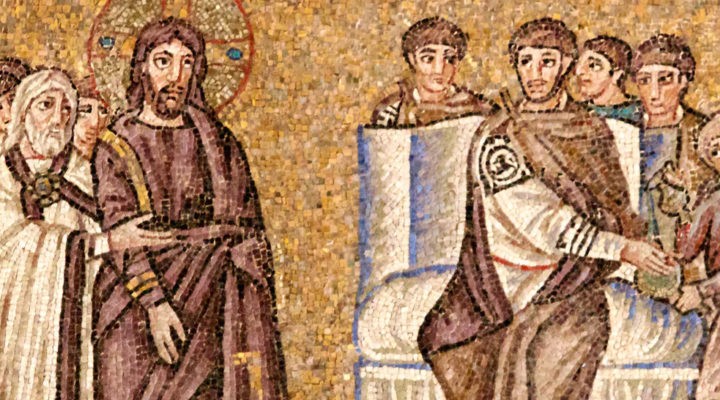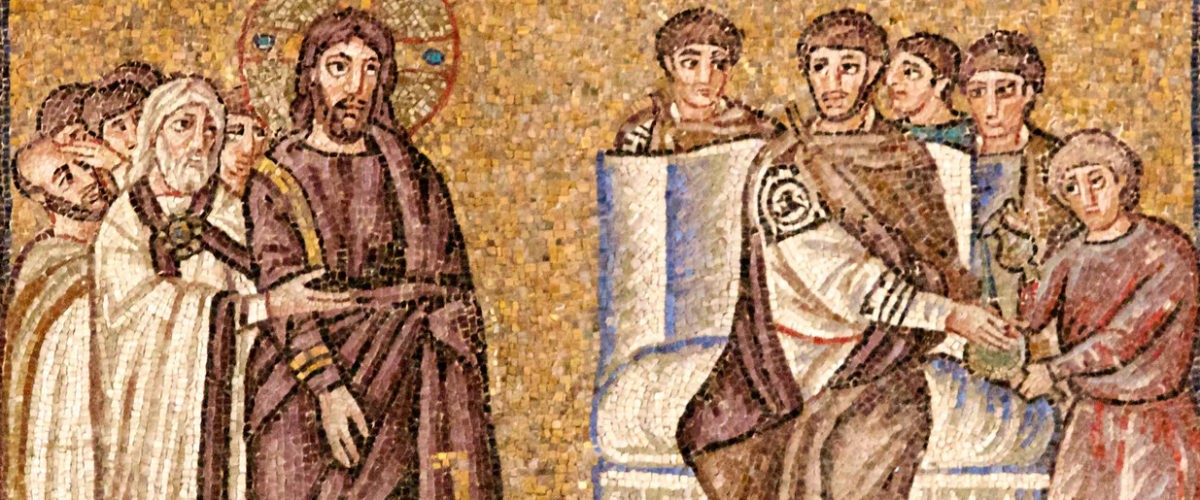“We don’t live in Ukraine, but we do,” said our minister, Glenn Pettiford, as he began a pastoral prayer on a recent Lenten Sunday morning. His words have stayed in my head on the way to Gethsemane and Golgotha 2022, as pictures from the Ukrainian village of Bucha hit the airwaves. There, before the world’s eyes, unarmed Ukrainian citizens lie dead in streets — executed, witnesses say, by Russian soldiers in an unprovoked war for land and power.
In Holy Week 2022, the words of Jeremiah describe a similar invasion 2,800 years ago that seems hauntingly contemporary:
Death has climbed in through our windows.
It has entered into our fortified houses.
It has taken away our children who play in the streets.
It has taken away our young men who gather in the city squares. (Jeremiah 9:21)

Bill Leonard
In Holy Week 2022, we watch as the Ukrainian people (71.7% of whom claim Christianity) are living and dying through their own experience of Gethsemane and Golgotha, and, like the earliest disciples, with no Easter in sight.
Last January, when our friend the Spanish journalist Alfonso Armada requested my reflections on “the meaning of Jesus in these odd times,” I knew it required a series of monthly responses that carried us through Gethsemane and Golgotha, those biblical, historical locales inseparable from the meaning of Jesus then and now.
What I did not know then is that Holy Week 2022 would occur at a moment when the realities of Gethsemane and Golgotha would become visible through the suffering of courageous Ukrainians. In A Scandalous Providence, theologian Frank Tupper wrote: “Abba, suffering, hope — does the path of Jesus through Gethsemane mean that his disciples may follow him through a Gethsemane of his or her own? Is suffering ever so singular, so intense, so bereft of consolation that we can speak of the Christian in Gethsemane? Yes, it seems so.”
As unique as it first appears, the Gethsemane experience did not end with Jesus. Rather, for the church at its best, Jesus’ own encounter with and response to evil is a sign for confronting Gethsemanes that can fall on any of us, anytime. Tupper wrote: “The portrait of Jesus with his disciples in Gethsemane is a graphic paradigm of the painful pathos of the providence of God for all humanity. One who resisted the invasion of Nothingness into his life is nonetheless threatened by the overwhelming devastation of demonic powers, principalities and powers housed in religious and political movements.”
Tupper noted that those untouched by such demonic devastation often “seem unaware and uninvolved.” He asked if such apathy might “hinder or limit the providential activity of God” and asserted that it did, “because the providence of God is vulnerable to the attitude and response of human agents.” Tupper died in 2020, courageously confronting his own Gethsemane.
We taught together at two schools, team-teaching doctoral seminars at one for more than a decade. Each year he reminded the students (and me): “Don’t rush to Easter. You can’t get to the empty tomb until you tarry in Gethsemane and at Golgotha with Jesus.”
“Like Pontius Pilate before him, Vladmir Putin forces us to tarry in those environs once again.”
Like Pontius Pilate before him, Vladmir Putin forces us to tarry in those environs once again. In Holy Week 2022, the suffering, courage and determination of the Ukrainian people is at once heartrending and hopeful. I found such hope in a New York Times editorial by Jewish journalist and Vox media founder Ezra Klein titled, “The Enemies of Liberalism are Showing Us What It Truly Means.”
By liberalism, Klein means “a belief in human dignity, universal rights, individual flourishing and the consent of the governed.” These ideas and actions, he believes, were losing ground in the West until “Ukraine’s refusal to bend the knee to Vladimir Putin … reminded the West that, for those who have not yet learned to take it for granted, life under liberalism is worth fighting for.”
In words as hopeful as they are surprising, Klein links Christianity to those ideals. He writes: “Christianity, too, gleams with a light it often lacks in today’s politics, and even in its pews: Here is a religion that insists on the dignity of all people and centers the poor and the marginalized.” The forces of autocracy and power, Klein believes, “fear Christianity because they fear it cannot be tamed; even when the leaders they admire try to subvert it for their own purposes, it infects their societies with a latent egalitarianism, setting a trap that will inevitably be sprung.”
One of the great ironies of Holy Week 2022 is that it took a Jewish journalist to remind us that the meaning of Jesus “cannot be tamed” by those inside its walls or outside its gates ecclesiastically, politically, culturally. Restoring that untamed gospel (my words, not Klein’s) requires a serious self-critique of church and state alike.
Klein asks: “Can the constant confrontation with our failures and deficiencies produce a culture that is generous and forgiving? Can it be concerned with those who feel not just left behind, as many in America do, but left out, as so many Ukrainians were for so long?”
Klein responds to his interrogative in words that absolutely overwhelmed me: “The answer to that — if there is an answer to that — may lie in the Christianity the anti-liberals feared, which too few in politics practice. What I, as an outsider to Christianity, have always found most beautiful about it is how strange it is. Here is a worldview built on a foundation of universal sin and insufficiency, an equality that bleeds out of the recognition that we are all broken, rather than that we must all be great. I’ve always envied the practice of confession, not least for its recognition that there will always be more to confess and so there must always be more opportunities to be forgiven.”
In Holy Week 2022, for Ukrainians and the rest of us for whom Easter seems a long way off, Frank Tupper offers an incarnational hope, writing: “The Christian in Gethsemane has the companionship of one Friend who has been there before. In the silence of God in the valley of a deep sorrow, Jesus stands with his brother and sister, arms circled round, tears running down, sharing common ground. The Christian learns in his Gethsemane, in her Gethsemane, that he or she is not alone. We experience the silence of God in the silent companionship of the Friend of tax collectors and sinners.”
If that’s not the meaning of Jesus in these odd times, then we may never get to Easter.
Bill Leonard is founding dean and the James and Marilyn Dunn professor of Baptist studies and church history emeritus at Wake Forest University School of Divinity in Winston-Salem, N.C. He is the author or editor of 25 books. A native Texan, he lives in Winston-Salem with his wife, Candyce, and their daughter, Stephanie.
Previous columns in this series:
The meaning of Jesus in these odd times


